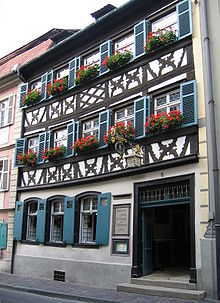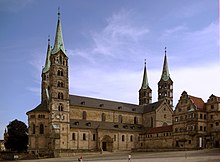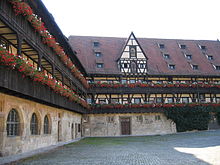Bamberg  Old town hall (Altes Rathaus) in Bamberg
Old town hall (Altes Rathaus) in Bamberg

Coat of arms
Coordinates:  49°54′N 10°54′ECoordinates:
49°54′N 10°54′ECoordinates:  49°54′N 10°54′E
49°54′N 10°54′E Country Germany State Bavaria Admin. region Upper Franconia District Urban districts of Germany Government • Lord Mayor Andreas Starke (SPD) Area • Total 54.62 km2 (21.09 sq mi) Population (2015-12-31)[1] • Total 73,331 • Density 1,300/km2 (3,500/sq mi) Time zone CET/CEST (UTC+1/+2) Postal codes 96047, 96049, 96050, 96051, 96052 Dialling codes 0951 Vehicle registration BA Website
Type Cultural Criteria ii, iv Designated 1993 (17th session) Reference no. 624 State Party Germany Region Europe and North America
Bamberg (German pronunciation: [ˈbambɛɐ̯k]) is a town in Upper Franconia, Germany, on the river Regnitz close to its confluence with the river Main. A large part of the town has been a UNESCO World Heritage Site since 1993.

Old town hall (Altes Rathaus) in Bamberg
 Coat of arms |
 49°54′N 10°54′ECoordinates:
49°54′N 10°54′ECoordinates:  49°54′N 10°54′E
49°54′N 10°54′EContents
[hide]
[hide]
History[edit]
Historical affiliations
 Prince-Bishopric of Bamberg 1245–1802
Prince-Bishopric of Bamberg 1245–1802  Electorate of Bavaria 1802–1805
Electorate of Bavaria 1802–1805
 Kingdom of Bavaria 1806–1871
Kingdom of Bavaria 1806–1871
 German Empire 1871–1918
German Empire 1871–1918
 Weimar Republic 1918–1933
Weimar Republic 1918–1933
 Nazi Germany 1933–1945
Nazi Germany 1933–1945
 Allied-occupied Germany 1945–1949
Allied-occupied Germany 1945–1949
 West Germany 1949–1990
West Germany 1949–1990
 Germany 1990–present
Germany 1990–present
 17th-century 3D-map of Bamberg. Matthias Merian in Danckerts, Historis, 1632.
During the post-Roman centuries of Germanic migration and settlement, the region afterwards included in the Diocese of Bamberg was inhabited for the most part by Slavs. The town, first mentioned in 902, grew up by the castle Babenberch which gave its name to the Babenberg family. On their extinction it passed to the Saxon house.[2] The area was Christianized chiefly by the monks of the Benedictine Fulda Abbey, and the land was under the spiritual authority of the Diocese of Würzburg.
In 1007, Holy Roman Emperor Henry II or Heinrich II made Bamberg a family inheritance, the seat of a separate diocese. The emperor's purpose in this was to make the Diocese of Würzburg less unwieldy in size and to give Christianity a firmer footing in the districts of Franconia, east of Bamberg. In 1008, after long negotiations with the Bishops of Würzburg and Eichstätt, who were to cede portions of their dioceses, the boundaries of the new diocese were defined, and Pope John XVIII granted the papal confirmation in the same year. Henry II ordered the building of a new cathedral, which was consecrated 6 May 1012. The church was enriched with gifts from the pope, and Henry had it dedicated in honor of him. In 1017 Henry also founded Michaelsberg Abbey on the Michaelsberg ("Mount St. Michael"), near Bamberg, a Benedictine abbey for the training of the clergy. The emperor and his wife Kunigunde gave large temporal possessions to the new diocese, and it received many privileges out of which grew the secular power of the bishop. Pope Benedict VIII visited Bamberg in 1020[3] to meet Henry II for discussions concerning the Holy Roman Empire. While he was here he placed the diocese in direct dependence on the Holy See. He also personally consecrated some of Bamberg's churches. For a short time Bamberg was the centre of the Holy Roman Empire. Henry and Kunigunde were both buried in the cathedral.
17th-century 3D-map of Bamberg. Matthias Merian in Danckerts, Historis, 1632.
During the post-Roman centuries of Germanic migration and settlement, the region afterwards included in the Diocese of Bamberg was inhabited for the most part by Slavs. The town, first mentioned in 902, grew up by the castle Babenberch which gave its name to the Babenberg family. On their extinction it passed to the Saxon house.[2] The area was Christianized chiefly by the monks of the Benedictine Fulda Abbey, and the land was under the spiritual authority of the Diocese of Würzburg.
In 1007, Holy Roman Emperor Henry II or Heinrich II made Bamberg a family inheritance, the seat of a separate diocese. The emperor's purpose in this was to make the Diocese of Würzburg less unwieldy in size and to give Christianity a firmer footing in the districts of Franconia, east of Bamberg. In 1008, after long negotiations with the Bishops of Würzburg and Eichstätt, who were to cede portions of their dioceses, the boundaries of the new diocese were defined, and Pope John XVIII granted the papal confirmation in the same year. Henry II ordered the building of a new cathedral, which was consecrated 6 May 1012. The church was enriched with gifts from the pope, and Henry had it dedicated in honor of him. In 1017 Henry also founded Michaelsberg Abbey on the Michaelsberg ("Mount St. Michael"), near Bamberg, a Benedictine abbey for the training of the clergy. The emperor and his wife Kunigunde gave large temporal possessions to the new diocese, and it received many privileges out of which grew the secular power of the bishop. Pope Benedict VIII visited Bamberg in 1020[3] to meet Henry II for discussions concerning the Holy Roman Empire. While he was here he placed the diocese in direct dependence on the Holy See. He also personally consecrated some of Bamberg's churches. For a short time Bamberg was the centre of the Holy Roman Empire. Henry and Kunigunde were both buried in the cathedral.
 Woodcut of Bamberg from the Nuremberg Chronicle, 1493
Woodcut of Bamberg from the Nuremberg Chronicle, 1493
 The Schlenkerla, one of Bamberg's breweries and taverns.
The Schlenkerla, one of Bamberg's breweries and taverns.
Historical affiliations

17th-century 3D-map of Bamberg. Matthias Merian in Danckerts, Historis, 1632.

Woodcut of Bamberg from the Nuremberg Chronicle, 1493

The Schlenkerla, one of Bamberg's breweries and taverns.
German Institute Taipei 德國在台協會分享了 ANTENNE BAYERN 的影片。
班貝格(Bamberg)
班貝格被列為世界文化遺產,這可確實不是靠偶然的機遇。班貝格有著一幅保存完整、規模宏大的老城風貌,這在整個歐洲也非常難 得;您若漫步其中,既可以很輕易地回到中世紀去,也可以領略巴洛克盛 期的風采。跟羅馬一樣,班貝格也建在七座山丘之上;在山丘上可以看到 一幅整體藝術傑作:中世紀的幽靜小巷、莊嚴雄偉的皇帝大教堂、新王宮 及其浪漫的玫瑰花園,甚至還有一座可以徑直入畫的小型威尼斯。
除了濃郁的藝術和文化魅力之外,您在班貝格還可以盡享釀酒藝術的豐碩 成果,這裡有十家釀酒作坊和很多傳統的啤酒酒窖。山丘之還座落著很多 啤酒花園,客人可以一邊飲酒一邊俯瞰全城;客人當然也可以去釀酒作坊 開設的酒館,那裡特別悠然舒適。您一定要登上遊艇泛舟、乘坐馬車體驗 班貝格的萬般風情,當然您也應該去聽一場班貝格交響樂團的音樂會。
班貝格被列為世界文化遺產,這可確實不是靠偶然的機遇。班貝格有著一幅保存完整、規模宏大的老城風貌,這在整個歐洲也非常難 得;您若漫步其中,既可以很輕易地回到中世紀去,也可以領略巴洛克盛 期的風采。跟羅馬一樣,班貝格也建在七座山丘之上;在山丘上可以看到 一幅整體藝術傑作:中世紀的幽靜小巷、莊嚴雄偉的皇帝大教堂、新王宮 及其浪漫的玫瑰花園,甚至還有一座可以徑直入畫的小型威尼斯。
除了濃郁的藝術和文化魅力之外,您在班貝格還可以盡享釀酒藝術的豐碩 成果,這裡有十家釀酒作坊和很多傳統的啤酒酒窖。山丘之還座落著很多 啤酒花園,客人可以一邊飲酒一邊俯瞰全城;客人當然也可以去釀酒作坊 開設的酒館,那裡特別悠然舒適。您一定要登上遊艇泛舟、乘坐馬車體驗 班貝格的萬般風情,當然您也應該去聽一場班貝格交響樂團的音樂會。
ANTENNE BAYERN
Bamberg, du märchenhafte Stadt! Du bist verträumt und lebendig, ein Ort wie kein anderer. Einfach Freak-City  ❤️
❤️





沒有留言:
張貼留言